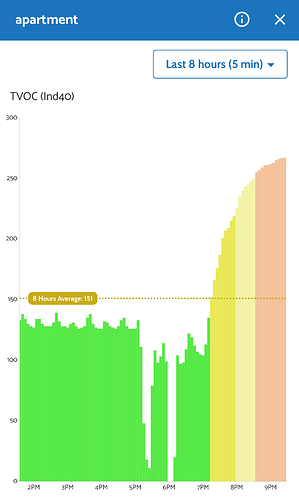Today I calibrated my AirGradient One with the windows open to get a good, fresh air baseline. Shortly after I closed the window, the VOC number consistently rose up to 250. I understand it’s to be expected that there are more VOCs indoors than outdoors, but is this big of a jump normal or something I should be concerned about?
Hi @Elias!
Welcome to the community! I wonder if it was your Reddit post that I responded to yesterday?
This sounds frustrating, and you’re absolutely right to question the readings when your nose says otherwise. I’ll try to explain what might be happening very simply:
Low-cost VOC sensors continuously adapt to what they interpret as your “normal” environment. By default, they use a 12-hour baseline learning period, so if you’ve been in a high-VOC environment for some time, the sensor gradually treats that elevated level as “clean.”
When you took your monitor outdoors or to a well-ventilated area, it allowed the sensor to relearn what truly clean air looks like. You should see readings rise again if there’s a genuine VOC source indoors. (Note that there are harmful and harmless VOCs and the sensor is sensitive to all VOCs).
You can also slow down how quickly the sensor adapts its baseline in the AirGradient Dashboard > General Settings > Calibration > VOC/NOx Index Learning Time Offset Duration. Setting this to the maximum (720 hours) makes it less forgiving of constant emissions and helps track persistent VOC sources more reliably.
Again, keep in mind that VOC sensors are broadband sensitive, which means they respond to many different VOCs, not just harmful ones. This means there can be false positives (e.g., from alcohol wipes, hand sanitizers, or cleaning products) in complex indoor environments. They’re best used to track trends and relative changes , rather than as instruments for absolute concentration or exposure assessment.
If you suspect something in your apartment is affecting your health, it might be best to consult an indoor air quality professional.
If you’d like to dive deeper into what these sensors measure and their limitations, we’ve got a short explainer here: TVOC - When it's useful and when it's useless
Hope that helps you narrow down what’s going on in your apartment and get closer to finding the source!
